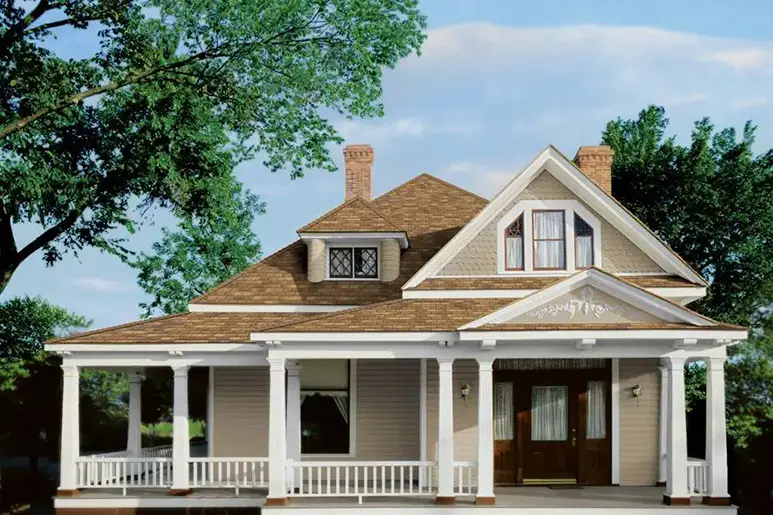Residential roofing systems are an essential part of any home, protecting it from harsh weather conditions and providing insulation. With the numerous types of roofing materials and designs available in the market, choosing the right roofing system can be overwhelming. In this guide, we’ll provide you with a comprehensive overview of residential roofing systems to help you make an informed decision.
There are various options to take into consideration when deciding on the best kind of residential roofing for your house, each having its own special features.
Types of Residential Roofing
Asphalt shingle roofing: Asphalt shingle roofing is the most common residential roofing system in the US, with over 70% of homes using it. This roofing system consists of a base mat made of fiberglass or organic materials, coated with asphalt and covered with granules. Asphalt shingles come in a variety of colors, shapes, and sizes, making them a versatile option for homeowners.
Metal roofing: Metal roofing is gaining popularity among homeowners due to its durability and energy efficiency. It’s made of metal panels or tiles and can last for up to 50 years. Metal roofs reflect sunlight, reducing the amount of heat absorbed by the home, thus lowering energy bills.
Tile roofing: Tile roofing is a popular roofing system in the southern US due to its aesthetic appeal and durability. Tile roofs are made of clay, concrete, or slate tiles and can last for over 100 years with proper maintenance. Tile roofs are excellent insulators, keeping homes cool in summer and warm in winter.
Flat roofing: Flat roofing is a popular option for modern homes due to its sleek design. Flat roofs are typically made of PVC, TPO, or EPDM membranes, which are highly durable and resistant to weather elements. Flat roofs are easy to maintain and can be used as outdoor living spaces.
Slate roofing: Slate roofing is a high-end roofing option, popular for its natural beauty and longevity. Slate roofs can last for over a century and are resistant to fire, wind, and water. They are also excellent insulators, reducing energy costs.
License and Insurance
The first thing to consider when hiring a roofing contractor is whether they are licensed and insured. A licensed contractor has met the minimum requirements to legally operate in their state, which includes passing an exam, having liability insurance, and proving that they have a minimum amount of experience.
In Atlanta, roof insurance claims are common due to the frequent storms and hail that hit the city. Homeowners with damaged roofs can file an insurance claim to get their roofs repaired or replaced. It’s essential to work with a reputable roofing contractor who can help with the insurance claim process and ensure that the roof is repaired or replaced correctly.
Experience and Reputation
Experience matters when it comes to roofing services. Look for contractors who have been in business for several years and have a good reputation within the community. Check for reviews and ratings online, and ask for references from the contractor to speak with previous clients about their experience.
Quality of Materials
A contractor’s experience is only as good as the materials they use. Make sure the contractor only employs strong, long-lasting materials of the highest grade. Cheap or substandard materials may save you money in the short term, but will ultimately cost you more in repairs and replacements in the long run.
Warranty
A warranty is an important factor to consider when hiring roofing services. A reputable contractor will offer a warranty on their work, which gives you peace of mind knowing that if there are any issues with the roof in the future, they will take care of it.
Communication
When it comes to any service, communication is essential. Look for a contractor who is willing to answer your questions and keep you informed throughout the process. A good contractor should be able to explain the work that needs to be done, the timeline, and any potential issues that may arise.
Price
Price is a crucial consideration, but it shouldn’t be the only one. The lowest bid may not always be the best option, as it may indicate that the contractor is cutting corners or using substandard materials. Look for a fair and reasonable price that is in line with industry standards.
In conclusion, a residential roofing system is a significant investment for homeowners. It’s crucial to choose the right type of roofing material and work with a reputable roofing contractor to ensure quality installation and maintenance. By considering these factors, you can make a more informed decision when hiring roofing services for your home. Additionally, make sure that your roof is covered by insurance to protect your investment in case of damage.


 What are the different types of roofing services?
What are the different types of roofing services? Different Types of Roofing Services: A Comprehensive Guide
Different Types of Roofing Services: A Comprehensive Guide Outdoor Makeover Roofing & Exteriors: Simplifying the Roof Insurance Claim Process for Homeowners
Outdoor Makeover Roofing & Exteriors: Simplifying the Roof Insurance Claim Process for Homeowners
LET'S BE SOCIAL: